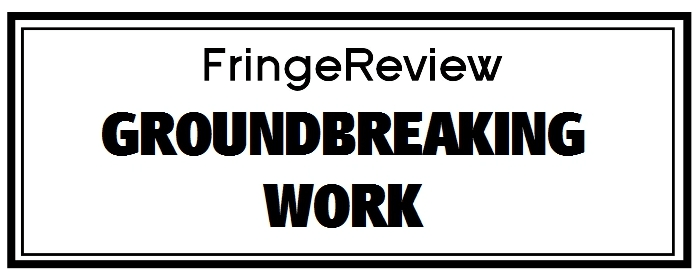FringeReview UK 2023
Imposter 22
Royal Court Theatre

Genre: Comedy, Contemporary, Drama, Mainstream Theatre, Neurodiverse, New Writing, Political, Theatre
Venue: Royal Court Jerwood Theatre Downstairs
Festival: FringeReview UK
Low Down
Like Travis Alabanza’s and Debbie Hannan’s Sound of the Underground in January, this is ground-breaking in its (very different) diversity; not just for the Royal Court, but mainstream. A joyous, riotously funny, wholly untypical experience. A play to shift boundaries and ourselves.
Written by Molly Davies, Directed by Hamish Pirie, Designed by Cai Dyfan, Lighting Design Anna Watson, Sound Designer XANA, Video Design Lewis den Hertog, Movement Director Yami Lofvenberg, Assistant Director Aneesha Srinivasan, Voice Coach Christopher Holt, Artistic Associate Nick Llewellyn,
Stage Manager Verity Clayton, DSM Fran O’Donnell, ASM Adriana Perucca, Creative Support Workers Kat Bond, Stella Farina, Gemma Harvey, Heather Johnson, Unique Spencer
Till October 14th
Review
Like Travis Alabanza’s and Debbie Hannan’s Sound of the Underground in January, this is ground-breaking in its (very different) diversity; not just for the Royal Court, but mainstream. Molly Davies’ Imposter 22 premieres at the Royal Court Downstairs directed by Hamish Pirie till October 14th. All performances are relaxed.
Featuring a mainly neurodivergent cast its premise is riotous and the challenge is some of us. “We need to start at the start. Yes, yes, we do or the Neurotypicals will be confused” as Housni Hassan (DJ), plying Kev tells us before the Cabaret curtain lifts on Cai Dyfan’s set – featuring an octagonal hollow lighting gantry – which elaborates with a forest of fronds for Act Two’s Island, soft-lit by Anna Watson whose effects are beguiling here.
But we’re not audiences, we’re witnesses. And again the problem is how a depressed neurotypical Joe (Jamael Westman, of Hamilton fame who mainly plays Danny) strays into a drama class tagging onto Todd (Dayo Koleosho) who’d given him a hug on the Jubilee. But Todd often does that. And that unravels as Joe takes it personally.
The work’s been developed collaboratively over five years by Access All Areas’ learning disabled and autistic Associate Artists, alongside Davies from an original idea by director Pirie.
If Imposter 22 is “a playful account of navigating barriers, neurodiversity and the power of sharing a platform” it’s also a warning. The catalytic result of intrusion and not knowing where boundaries lie. Joe’s a gentle neurotypical individual whose awareness or radar is blunted by depression, and he sets off a chain-reaction. From tagging along with Todd, encountering Chloe as gatekeeper quizzing Joe (Charlene Salter, an authoritative performance), we see a grudging provisional acceptance as they disperse.
Except… Rose (Stephanie Newman on this occasion) has taken a fancy to him and he returns home with her. Newman, who has less to do in Act Two though wearing a dress of serious intent, enjoys blissful comic timing, especially with put-downs and blunt come-ons. More than a running joke on men not knowing how to negotiate female sexuality, it’s at another level of squirm.
Subsequent awkwardness and sex references are bitingly funny but gentle, acerbic, even sweet as not everything can go right. Especially when parents Kirsty Adams and Cian Binchy turn up.
But there’s that island, and Joe, with little else to sustain him, again tags in the friends’ wake.
As a result seven friends from the drama class are in the frame for murder – the police must be closing in. There’s enough siren noises (vocalised) to keep up the suspense. Joe’s come with them to the island and now presumed dead.
As the friends reconstruct what happened they recruit Danny (also Westman) to play Joe. There’s a riff on literalness. Kev (Hassan’s energy throughout is infectious, confiding and up-front) anxiously asks: “Voice! His voice! Joe was from Crystal Palace!” Chloe, ever the reassurer chimes: ”He’s not gonna be one hundred percent, Kev.” Blink and you miss such exquisite jokes.
Friends morph into suspects, the experience ripples through them. Everyone’s considered in turn, allowing set-pieces and props on and off, including a pink paddle-boat. Jokes and songs continue to a final heart-warming surprise.
The script’s developed with the company. It’s fleet, using some litanic elements. There’s political awareness of the war on beggars, or how down the police-surveillance food-chain the friends are. Not enough, but there’s dodgy characters:
“Doing extremely illegal highly suspicious things as we know. Doing far worse things than possibly fleeing a murder scene.”
Dayo Koleosho’s Todd is mordantly funny, switching from deadpan to eloquence. Kirsty Adams’ Blossom underscores accusations as well as hurt, and Cian Binchy’s Jake is both protective (especially as Rose’s father) and provocative. Charlene Salter again marshals everyone on the island and Lee Phillips’ Geoff balances action with nailing vocal delivery. Rose on some occasions will also be played by Anna Constable.
There’s a battery of jokes aimed at neurotypical behaviour but it’s important to underscore how diverse they are. Early on there’s a wise display of such difference. Jake unlike Geoff and Todd doesn’t feel Geoff’s benefit of “hugs not drugs”. But he perceives its effect on Joe, looked at as if in a laboratory.
“Yes, what is going on here is Joe’s serotonin levels are increasing to make him feel all happy and calm. There will be endorphins racing round his body. They are basically the same as painkillers but much better as they are thirty times more effective and not as addictive.”
Jake adds the effect lowers addiction too, going into pharmaceutical detail. Self-ironising is a constant, but much of the time the message is, look at ourselves.
The set’s augmented by Lewis den Hertog’s video design for suspect police-style boards, and XANA’s sound. Despite the ‘relaxed performance’ element, there’s very little audience movement. We’re riveted. There’s crew supports and prompts – but discreet, not obtrusive, not often needed. A joyous, riotously funny, wholly untypical experience. A play to shift boundaries and ourselves.


















































